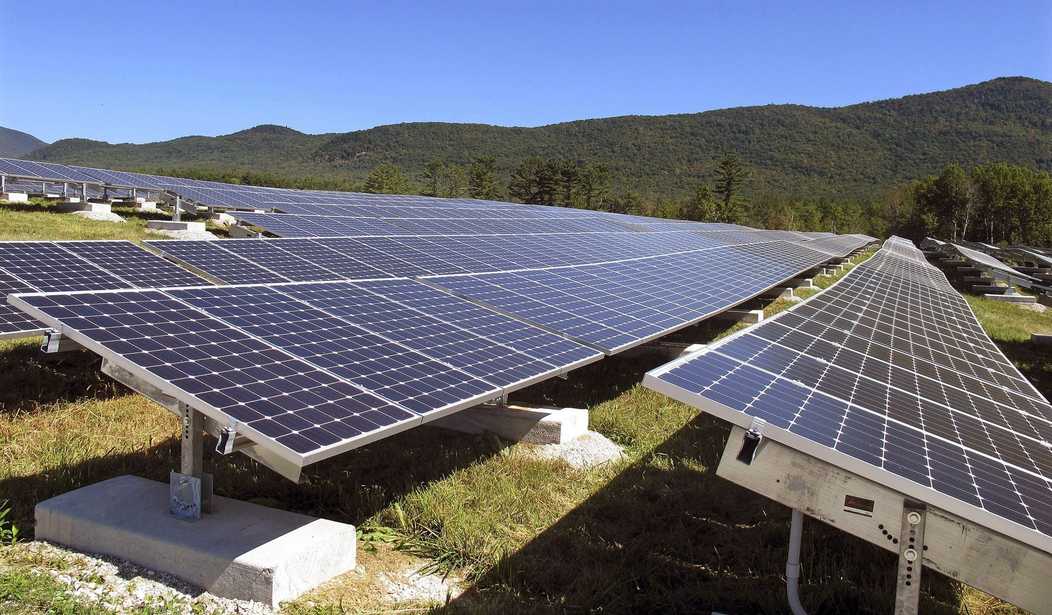Once again, we see proof of what some of us have been pointing out for years: Most of the left's favored "green energy" schemes aren't economically viable. Even when propped up with government subsidies, so many of these efforts founder on the rock of economic reality.
Now there's another. A solar energy company, Sunnova, has filed for Chapter 11 bankruptcy. Note that Chapter 11 doesn't mean a complete failure, but rather a restructuring, but it's still bad; the company's stock price has plunged into the basement, broken through the slab, and is now burrowing into the bedrock.
Sunnova Energy said on Sunday it had filed for Chapter 11 bankruptcy protection in the United States, as the residential solar panel installer buckled under the pressure of mounting debt and weakening demand.
Shares were down 36.4% at 14 cents in premarket trading.
Sunnova filed for protection in the Bankruptcy Court for the Southern District of Texas after warning in March that it might not be able to continue as a going concern.
The company listed its estimated assets and liabilities in the range of $10 billion to $50 billion and has a total debt of $10.67 billion as of December 31, according to a court filing.
Sunnova said last week it would lay off about 55% of its workforce, or 718 employees, in a bid to cut spending.
This is sad for Sunnova's workers, but it's not terribly surprising. We might note, though, that this announcement comes on the heels of the Trump Administration's yanking nearly $3 billion in loan guarantees. That means that the taxpayers would have been on the hook in the event of default. Here's a "key takeaway" from that announcement that's key indeed:
Sunnova prefers to market directly to residential consumers and obtain tax credits, rather than pursue less lucrative loan credits for its low-income installation proposal that attracted the guarantee.
Tax credits. As in, taxpayer subsidies. For a solar energy company that's not profitable without them, as evidenced by a Chapter 11 filing.
See Also: Spain, Portugal Plunged Into Darkness Amid Widespread Blackouts—What's the Cause?
What Could Possibly Go Wrong? Communications Devices Found Hiding in Chinese Solar Power Components
And this isn't the first such failure.
Last year, peer SunPower, once a pioneer of the U.S. residential solar market, also collapsed following a subpoena from the U.S. Securities and Exchange Commission about its accounting practices and the departure of its CEO.
Companies that put solar panels on U.S. homes said last month a Republican budget bill that has advanced in Congress could deal a massive blow to the industry by eliminating a generous subsidy for homeowners that had buttressed the industry’s growth.
Good. If these companies can't make a profit without a "generous subsidy," then they were never economically viable in the first place. Markets, not governments, should be making these decisions, and homeowners and people managing commercial properties, when considering such a decision, should be basing that decision on actual costs, not fake numbers based on subsidies from the government. Those subsidies, we remind you, are tax dollars, taken from the citizens by force of law, trickled through who knows how many layers of bureaucracy, and then dribbled out in the form of these subsidies.
What an enormous waste of money and technology. At least the subsidy side of this appears to be being addressed, and if Sunnova can make a go of it without those, more power to them.
And, yes, once again: This is what we voted for.
DOGE is finding billions of dollars in wasteful spending, and the Democrats are losing their minds as they realize their gravy train and woke projects are coming to an end.
Help us continue to report on DOGE's accomplishments and expose leftist corruption. Join RedState VIP and use promo code FIGHT to get 60% off your membership.















Join the conversation as a VIP Member